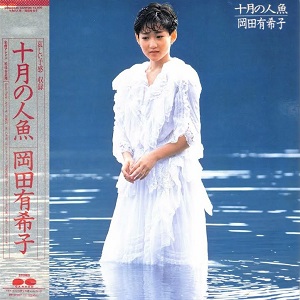
|
All songs arranged by Masataka Matsutouya |
Juugatsu no NingyoLP, Cassette, CD: 1985-09-18 UHQCD: 2015-09-16 Bonus Tracks (2015 Release): Koibitotachi no Calander |
Review:
Juugatsu no Ningyou (October Mermaid) evolves Yukiko’s sound and image in a fascinating new direction. Gone is the girlish pink of Cinderella, the youthful smile of Fairy. There is an aura of mystery, as she stands there with a contemplative expression, surrounded by water in long, robe-like dress.
This is the first album to lean in a science-fiction direction, with songs like Sweet Planet and Ryuusei no Kougen’s demonstrating an otherworldly sound coupled with lyrics of the stars. Most of the songs on this album are extremely solid, and the quality is noticeably higher than Fairy. Mizuumi, Ryuusei no Kougen and Juugatsu no Ningyo are extremely solid tracks, and it’s really good to have Mariya Takeuchi back. Lonesome Season is one of my all-time favourites, with its melancholic lyrics and memorable melody that tugs at my heart.
But the real star of this album is Tetsuya Komuro. He would go on to become the single most recognisable record producer in Japan, and this album is significant in marking his very first songwriting credit. His talent is very much on display here, both on Sweet Planet, and Mizuiro Princess. Mizuiro Princess is one of my all-time favourite Yukiko tracks. This song is packed with hooks, the banging drum machine giving way to the pre-chorus, the whispered ‘Humpty Dumpty oshiete’ right before the chorus. I love this song to bits. I also have to give credit to Yoshiko Miura, whose surreal fairytale lyrics fit perfectly with the song. On the topic of lyrics, I really love Osamu Takahashi’s evocative, abstract lyrics to Kachouzu. They remind me of the kind of lyrics in Momoe Yamauguchi’s Moebius Game. Takahashi is a complete mystery, and I have no clue what work he’s done outside of Yukiko Okada, but his writing on this and the next album are really good.
While Fairy was unfocused in its image and direction, Juugatsu no Ningyo brings to mind water, in the context of science-fiction and fantasy, with songs titles like Mizuumi (Lake), and Mizuiro Princess – Mizu no Sei - (Aqua Princess – Fairy of Water -) Not every track references these themes, but the throughline is present enough to give this album a strong, coherent vision. Asides from a few songs I dislike (I’m not crazy about Bien or Penalty), I think this album is really strong, and a fascinating evolution of Yukiko Okada’s image as an idol.
Favourite Track (non-single): Mizuiro Princess -Mizu no Sei -
Least Favourite Track: Bien